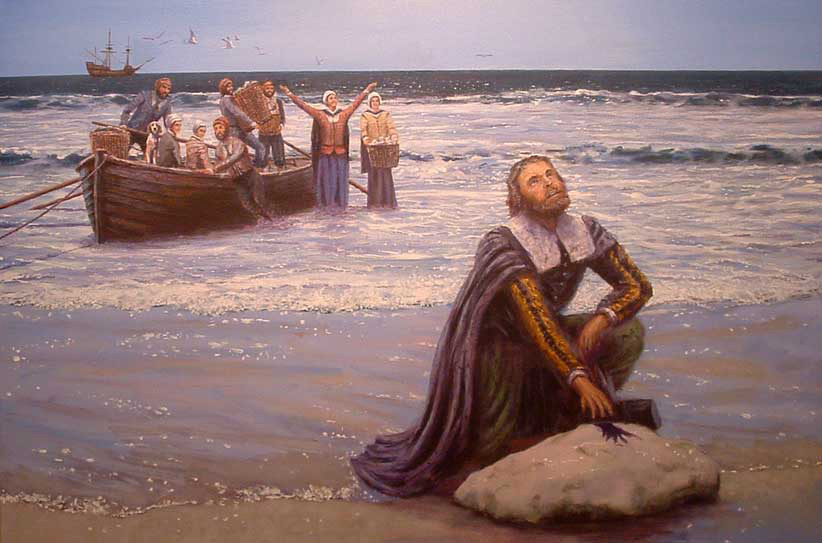[NOTE: Knowing that this post would be published after Christmas Day, I debated whether I wanted to post this somewhat grumpy post on Christmas in America. I decided to do so, so consider this your reminder that the Christmas Season actually stretches from the Nativity to the Epiphany, and not from Black Friday to December 25th, which of course brings me to the topic of this post...]
Christmas is the biggest American holiday. This is obvious, but it seems counter-intuitive for a self-proclaimed non-sectarian nation, especially one that was founded by and took much of its cultural capital from a religious group (pictured) that deeply mistrusted Christmas. No other American holiday has a whole season dedicated to preparing for it-- a season which isn’t clearly defined and which keeps getting longer-- and which has a whole day dedicated to purchasing gifts for it (a day which, tellingly, is attached to America’s second biggest holiday.)
American Christmas has also expanded outwards, as American Jews, as well as other Americans hoping for a more inclusive Holiday, have put greater emphasis on Hanukkah, a feast of comparatively little historical importance for Jews. Christmas has also gained a mythology as a pagan festival, and the Santa Claus mythos has taken on new life, with its own liturgies that exist apart and completely separate from the official Christian liturgy.
Santa Claus, in his current form, was more or less manufactured by the arch-American Coca-Cola Company. Christmas movies, even the classics such as It’s a Wonderful Life and A Christmas Story, can exist without reference to the nativity, even if other “supernatural” events occur. (It’s a Wonderful Life, of course, deals with angels, but not in any way recognizable by the orthodox creed.) The Christmas holiday and traditions, then, are broadened in attempt to allow participation to even those who want no part in the narrative of the nativity.
Is all of this just consumerism? Well, some of it is, but that answer isn’t quite so simple as to “Put Christ Back in Christmas” or to “Remember the Reason for the Season.” We can’t simply replace the secular or pseudo-secular liturgies of American Christmas with a Christ-centered mythos and expect to be able to capture the truly revolutionary element of Christ’s nativity. The answer is not to retreat away from all the secular festivities, especially not those of feasting and merriment. If there is one thing thing that the Nativity and, by extension the Incarnation, should teach us, it is that the world is not all bad, indeed that it is fundamentally good, and that there are some things truly worth celebrating in this world.
 |
| Christmas should be at least as awesome as it looks |
The whole celebration seems to pale behind such a monumental claim. If we are guilty of anything, we are guilty of not celebrating Christmas enough. The biggest American holiday is not nearly big enough to do justice to what it represents. Our own rituals will always pale in comparison to the Incarnation, but this feast is a response, not a creation of our own. Certain things, the simple beauty of Christmas carols, the love between a family together, can reflect this. The birth of the Savior should be met with as much exuberance as a child facing a whole pile of unopened presents, at the very least. Perhaps it is truly only the children understand Christmas.

Image 1
Image 2
Image 3
Image 4



0 comments
Note: Only a member of this blog may post a comment.